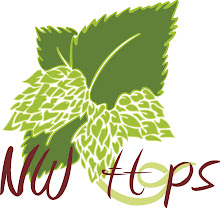Hops have been used to feed animals and provide bedding that dates back to ancient times. It's kind of a shock farmers don't utilize their hops more, especially when the market is flooded because many brewers are starting to grow their own. Hops reduces bacterial growth in many livestock animals which can prevent many illnesses such as, ammonia, strangles, mad cow and more.
Ammonia
Cattle are ruminants, which means they have a digestive system that allows use of processing indigestible foods by regurgitating and re-chewing it as "cud". They then re-swallow the cud for further digestion in the rumen that is filled with microorganisms. These microbes are primarily responsible for decomposing cellulose and other carbohydrates into volatile fatty acids that cattle use as their primary metabolic fuel. In the rumen cattle produce a hyper-ammonia-producing bacteria or HAB that break down their amino acids, which is a chemical process that produces ammonia and steals the animal of amino acids that build muscle tissue.
For decades, farmers had to purchase expensive feeds to reduce HAB growth. Recently, studies have proved that hops can reduce HAB growth and ammonia production. Makes sense, I mean that is why hops were originally added to beer, to reduce bacterial growth.
Strangles
Horses, dogs and other breeds of animals get a bacterial disease called strangles, also known as distemper, which infects the upper part of the respiratory tract and makes it hard to breathe. Hence the name strangles. I found an old recipe farmers have used for horses with strangles.
2 ounces hops
30 drops of carbolic acid
Mix with hot water and make the animal inhale the steam for 15-20 minutes. Repeat 3 times a day. Apply a warm mustard paste to the throat and place a warm poultice over the paste. Feed the animal warm mashes and steamed vegetables.
Give following powders once a day.
2 ounces Peruvian bark
1 ounce powdered gentian
1 ounce powdered copperas
Mix all together and split into 8 powders.
There is a wide range of uses for hops, yet most hop growers still only use it for brewing beer. If we as a society use our natural resources instead of making chemically processed foods and antibiotics for our animals, we as humans will consume better food without the unnecessary hormones and chemicals farmers are having to put into our food.
Farm green live well!
- Resources -
Guy, Chris, April 20, 2010, "Hops Helps Reduce Ammonia Produced by Cattle" http://www.ars.usda.gov/is/pr/2010/100420.htm Accessed 20 May 2010
Dunning N. A. (1891) The farmers' alliance history and agricultural digest (pg 677). Washington, D.C.: Alliance Publishing Company
Friday, May 21, 2010
Subscribe to:
Posts (Atom)

